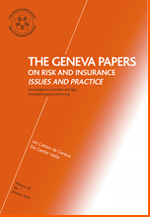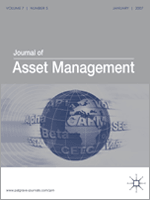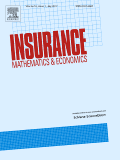
JOURNAL OF RISK AND UNCERTAINTY
Scope & Guideline
Unlocking insights in the realm of risk.
Introduction
Aims and Scopes
- Behavioral Analysis of Risk Preferences:
The journal emphasizes understanding how individuals perceive and respond to risk through behavioral experiments, exploring concepts like risk aversion, ambiguity aversion, and decision-making processes. - Interdisciplinary Approaches to Risk:
Research published often integrates insights from economics, psychology, and health sciences, providing a comprehensive view of how risk and uncertainty affect human behavior in different contexts. - Impact of External Factors on Risk Behavior:
The journal frequently examines how external events, such as economic crises or health pandemics (e.g., COVID-19), influence individual and collective risk-taking behavior. - Quantitative and Qualitative Assessments:
It utilizes both quantitative methods, such as statistical analysis and modeling, as well as qualitative approaches, including surveys and experimental designs, to assess risk-related behaviors. - Policy Implications of Risk Research:
The journal aims to inform policy-making by analyzing how risk preferences affect decisions related to health, finance, and social issues, thereby contributing to effective risk management strategies.
Trending and Emerging
- Impact of COVID-19 on Risk Preferences:
An increasing number of studies are examining how the COVID-19 pandemic has altered individual and societal risk preferences, highlighting the relevance of health crises on decision-making. - Exploration of Ambiguity Aversion:
There is a growing interest in ambiguity aversion, particularly in how it affects decision-making under uncertainty, with new experimental findings contributing to this theme. - Risk Behavior in Health Contexts:
Research focusing on health-related risk behaviors, such as vaccination uptake and health decision-making, is on the rise, reflecting a broader interest in public health implications. - Interdisciplinary Applications of Risk Research:
The journal is increasingly publishing studies that apply risk theories to diverse fields, including environmental economics, public policy, and behavioral finance, showcasing an interdisciplinary trend. - Technological Influences on Risk Behavior:
Emerging themes include the impact of technology and digital platforms on risk preferences, especially in areas like online gambling and health-related decision-making.
Declining or Waning
- Traditional Economic Models of Risk:
There has been a noticeable decline in research focused solely on classical economic models of risk (e.g., expected utility theory), as newer behavioral models gain traction. - Static Risk Assessment:
Studies centered around static risk assessments, which do not account for evolving preferences or contextual factors, have become less prominent, indicating a shift towards dynamic and context-sensitive approaches. - Simple Risk Preference Elicitation Techniques:
There is a waning interest in basic elicitation techniques for measuring risk preferences, with more complex and nuanced methods being favored in recent studies. - Focus on Individual Risk Preferences:
Research concentrating exclusively on individual-level risk preferences is decreasing, as there is a growing emphasis on social and contextual influences on risk behavior. - Historical Analysis of Risk Behavior:
Papers that primarily analyze historical trends in risk behavior without contemporary relevance are becoming less frequent, reflecting a demand for more timely and applicable research.
Similar Journals

International Journal of Financial Studies
Championing accessible research in the world of finance.The International Journal of Financial Studies is a premier publication dedicated to advancing the field of finance through open-access research. Published by MDPI based in Switzerland, this journal offers researchers, professionals, and students a platform to disseminate their findings in an accessible format since its establishment in 2013. With its ISSN of 2227-7072 and a commendable impact reflected in its Q2 ranking in finance, it occupies an influential position among finance-related journals, as evidenced by its 65th percentile rank in Scopus. The journal encompasses a wide array of topics in finance, making it essential reading for those seeking to stay abreast of current research trends and methodologies. As an open-access journal, all articles are freely available, significantly enhancing the visibility and reach of published studies, which is crucial for fostering collaboration and innovation within the global financial community. Published continuously until 2024, the International Journal of Financial Studies is not just a source of knowledge; it is a critical contributor to the progression of financial scholarship.

THEORY AND DECISION
Exploring the Intersection of Theory and Practical Decision-MakingTHEORY AND DECISION is a prestigious academic journal published by SPRINGER, which has been a cornerstone of interdisciplinary research since its inception in 1970. With an ISSN of 0040-5833 and an E-ISSN of 1573-7187, this journal offers valuable insights into a range of fields, including Applied Psychology, Decision Sciences, Economics, and more. Holding a remarkable position within various quartile rankings, such as Q1 in Arts and Humanities and Q2 in Economics, it signifies the journal's impact and relevance in modern academic discourse. Although not presently open access, it remains accessible to researchers and institutions that prioritize impactful studies and theoretical advancements. The journal's objectives include exploring decision-making processes and theoretical underpinnings that inform practical applications across disciplines, making it an essential resource for academics, professionals, and students dedicated to advancing knowledge in their respective fields. THEORY AND DECISION continues to shape the landscape of interdisciplinary research, providing a platform for innovative ideas and discussions that are crucial in today’s complex world.

GENEVA PAPERS ON RISK AND INSURANCE-ISSUES AND PRACTICE
Elevating Standards in Risk Assessment and Policy DevelopmentGENEVA PAPERS ON RISK AND INSURANCE-ISSUES AND PRACTICE is a leading academic journal dedicated to advancing the fields of risk management and insurance, published by the esteemed Palgrave Macmillan Ltd. With an ISSN of 1018-5895 and an E-ISSN of 1468-0440, this journal serves as a pivotal platform for sharing cutting-edge research and practical insights addressing a diverse range of issues within the insurance sector. Established in 1999, it spans a wide array of topics, including risk assessment, financial implications, and policy development, contributing to its recognition in the Q2 quartile across multiple categories such as Accounting and Economics. With a notable Scopus ranking reflecting its relevance—ranked #229/716 in Economics and Econometrics, and #106/317 in Finance—it provides invaluable resources for scholars, professionals, and policymakers alike. Despite being a non-open-access journal, the GENEVA PAPERS ensures a rigorous peer-review process, aiming to uphold the highest standards of scholarly publication. Whether you are a researcher looking to publish groundbreaking studies or a practitioner seeking the latest trends and analyses in the insurance landscape, this journal stands out as an essential resource in the domain.

JOURNAL OF INSTITUTIONAL AND THEORETICAL ECONOMICS-ZEITSCHRIFT FUR DIE GESAMTE STAATSWISSENSCHAFT
Fostering critical insights for academia and policy-making.JOURNAL OF INSTITUTIONAL AND THEORETICAL ECONOMICS-ZEITSCHRIFT FUR DIE GESAMTE STAATSWISSENSCHAFT is a distinguished publication dedicated to advancing the fields of institutional and theoretical economics. Published by J C B MOHR in Germany, this journal serves as a critical platform for scholarly discourse and research dissemination, encouraging contributions that delve into economic theory and its practical implications in institutional contexts. With an ISSN of 0932-4569 and an E-ISSN of 1614-0559, it enjoys a respectable position, having achieved a Q3 ranking in Economics and Econometrics according to the 2023 categorization. This journal, which bridges theoretical frameworks with real-world applications, is vital for researchers, practitioners, and students seeking to deepen their understanding of economic systems and institutions. Although not an open-access journal, it provides insights valuable for both academia and policy-making. Operating since 1992, with a commitment to rigorous peer-reviewed scholarship, the JOURNAL OF INSTITUTIONAL AND THEORETICAL ECONOMICS remains a pivotal resource in the evolving landscape of economic research.

Journal of Asset Management
Exploring Strategic Insights for Asset GrowthThe Journal of Asset Management, published by Palgrave Macmillan Ltd, is a premier academic journal dedicated to advancing the fields of asset management, business strategy, and international management. With an ISSN of 1470-8272 and an E-ISSN of 1479-179X, this journal has established its reputation as a vital resource for researchers, professionals, and students alike. Operating from the United Kingdom, it spans a convergence of scholarly contributions from 2009 to 2024, positioning itself prominently in the academic landscape. In 2023, it achieved a remarkable Q2 ranking in three key categories: Business and International Management, Information Systems and Management, and Strategy and Management. The journal's Scopus ranks further reflect its impact, featuring positions within the top percentile for relevant academic disciplines, emphasizing its importance and influence. While it currently offers traditional subscription-based access, the journal remains committed to disseminating vital research that shapes best practices in asset management. Researchers are encouraged to engage with the cutting-edge findings published herein, making it an essential tool for anyone looking to deepen their understanding of asset management dynamics and strategic decision-making.

JOURNAL OF EXPERIMENTAL PSYCHOLOGY-APPLIED
Bridging Theory and Practice in Cognitive ResearchThe JOURNAL OF EXPERIMENTAL PSYCHOLOGY-APPLIED, published by the American Psychological Association, is a premier outlet for cutting-edge research in the field of Experimental and Cognitive Psychology. With an impressive impact factor indicated by its Q1 ranking in 2023, this journal stands as a leading resource for scholars and practitioners, fostering a deeper understanding of the applications of psychological principles. With its extensive coverage from 1995 to 2024, the journal delivers a wealth of empirical studies, theoretical discussions, and methodological innovations that inform both academic learning and practical implementations in psychology. Although the journal does not offer open access options, researchers can gain insights into its influential findings through libraries or institutional subscriptions. Located in Washington, DC, it serves as a critical platform for disseminating high-quality research that bridges the gap between theory and real-world applications, supporting the advancement of knowledge in the vital area of human cognition and behavior.

SIAM Journal on Financial Mathematics
Connecting Theory and Practice in Financial MathematicsThe SIAM Journal on Financial Mathematics, published by SIAM PUBLICATIONS, is a premier journal dedicated to the intersection of applied mathematics and finance. With an ISSN of 1945-497X, this journal serves as a vital platform for the dissemination of innovative research that addresses complex financial problems through mathematical modeling and analytical techniques. The journal has established itself within the Q2 quartile in the categories of Applied Mathematics, Finance, and Numerical Analysis, reflecting its influence and significance in these fields. Researchers and practitioners will find a wealth of knowledge spanning topics from stochastic calculus to quantitative finance, making it essential for anyone aiming to advance their understanding of financial mathematics. As the journal continues to converge from 2010 to 2024, it promises to remain a cornerstone resource for academics, professionals, and students alike, facilitating the ongoing dialogue between mathematics and its applications in the financial industry.

INSURANCE MATHEMATICS & ECONOMICS
Advancing the intersection of insurance theory and economic practice.Insurance Mathematics & Economics, published by Elsevier, stands as a pivotal journal in the fields of economics and statistics, carrying the ISSN 0167-6687 and E-ISSN 1873-5959. Established in 1982, this journal aims to disseminate high-quality research that integrates insurance theory with economic principles, making significant contributions to both academic and practical spheres. With a notable Q1 ranking in the 2023 category quartiles for Economics, Econometrics, Statistics, and Probability, and a solid standing in Scopus ranks, it ranks #64 out of 278 in Mathematics and #45 out of 168 in Decision Sciences, showcasing its relevance and prestige in the research landscape. The journal not only facilitates a deeper understanding of insurance-related mathematical methodologies but also emphasizes the application of these techniques in real-world economic contexts. Researchers, professionals, and students alike can benefit from its rigorous approach to the challenges faced in insurance and economics, making it an essential resource for anyone involved in these dynamic fields.

ASCE-ASME Journal of Risk and Uncertainty in Engineering Systems Part A-Civil Engineering
Empowering Civil Engineering Through Insightful Analysis.ASCE-ASME Journal of Risk and Uncertainty in Engineering Systems Part A-Civil Engineering, published by the American Society of Civil Engineers (ASCE), is a leading journal dedicated to advancing the understanding and application of risk and uncertainty in civil engineering systems. With an ISSN of 2376-7642, this journal has been a pivotal platform for researchers and practitioners since its inception in 2015, converging its rigorous exploration through to 2024. It holds a commendable position in the academic community, securing a Q2 rating in categories such as Building and Construction, Civil and Structural Engineering, and Safety, Risk, Reliability and Quality as of 2023. The journal aims to disseminate innovative research that tackles the critical challenges posed by uncertainty in engineering systems, thus promoting safety, sustainability, and reliability in infrastructure. With impressive Scopus rankings, including a 76th percentile in Building and Construction, it continues to attract high-quality contributions from scholars worldwide. Emphasizing open dialogue, the journal does not currently adopt an open access model but remains committed to providing essential insights for the enhancement of civil engineering practices. Researchers, professionals, and students alike will find invaluable resources to enhance their knowledge and practice in this dynamic field.

Judgment and Decision Making
Illuminating the Pathways of Judgment and ChoiceJudgment and Decision Making is a premier journal published by Cambridge University Press, focusing on the interdisciplinary study of decision-making processes across various fields. With its Open Access policy since 2006, this journal is committed to promoting the dissemination of innovative research that advances our understanding of the cognitive and emotional factors influencing judgment and choice. As reflected in its impressive impact factor, Judgment and Decision Making holds prominent positions in prestigious categories such as Applied Psychology (Q2), Decision Sciences (Q1), and Economics and Econometrics (Q1), ensuring that it remains a vital resource for researchers and practitioners alike. Published in the United States, it covers diverse methodologies and practical applications, making it an essential venue for scholars aiming to contribute to and engage with current debates and advancements in decision-making theory and practice. With a convergence of insights from 2008 to 2024, this journal provides an invaluable platform for nurturing collaboration and dialogue across disciplines.